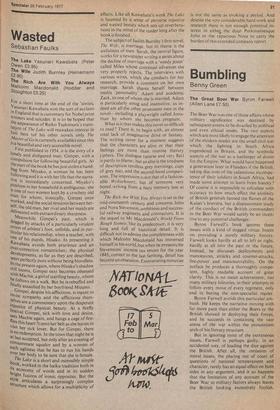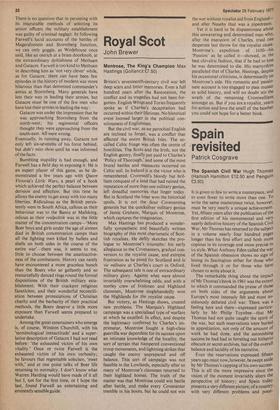Bumbling
Benny Green
The Great Boer War Byron Farwell (Allen Lane £7.50) The Boer War was one of those affairs whose military significance was destined by subsequent events to be dwarfed by political and even ethical issues. The two aspects which are most likely to engage the attention of the modern reader are the small civil war which the fighting in South Africa engendered in Britain, and the symbolic aspects of the war as a harbinger of doom for the Empire. What would have happened a generation later in Flanders if the British, taking due note of the calamitous incompetence of their soldiers in South Africa, had made some attempt to learn from history ? Of course it is impossible to calculate with accuracy to. how much effect the asininity of British generals fanned the flames of the Kaiser's bravura, but a dispassionate study of the conduct of the British commanders in the Boer War would surely be an incentive to any potential challenger.
Byron Farwell's book ignores these issues with a kind of dogged virtue. Intent on providing a purely military history, Farwell looks hardly at all to left or right, hardly at all into the past or the future. Instead, he discusses deployments and manoeuvres, attacks and counter-attacks, fire-power and manoeuvrability. On the surface he produces a thoroughly competent, highly readable account of great clarity. This is no mean achievement ; too many military hiStories, in their attempts to follow every move of every regiment, only end in boring the non-specialist reader.
Byron Farwell avoids this particular' ambush. He keeps the narrative moving with far more pace than either the Boers or the British showed in deploying their forces, and he succeeds in containing the vast arena of the war within the proscenium arch of his literary structure.
But in ignoring most of the extraneous issues, Farwell is perhaps guilty, in an accidental way, of loading the dice against the British. After all, the omission of moral issues, the placing out of court of questions of national temperament and character, rarely has an equal effect on both sides in any argument, and it so happens that the limitation of any account of the Boer War to military factors always leaves the British looking excessively foolish. There is no question that in persisting with its inscrutable methods of selecting its senior officers the military establishment was guilty of criminal neglect. In following Farwell's lucid accounts of the battles of Magersfontein and Stormberg Junction, we can only goggle. as Wodehouse once said, like an ostrich at a brass doorknob, at the extraordinary doltishness of Methuen and Gatacre. Farwell is too kind to Methuen in describing him as 'not very clever' while, as for Gatacre, there can have been few episodes in the history of modern war more hilarious than that demented commander's antics at Stormberg. Many generals have lost their way in leading their armies, but Gatacre must be one of the few men who have lost their armies in leading the way: Gatacre was under the impression that he was approaching Stormberg from the north-west ; his regimental officers thought they were approaching from the south-east. All were wrong.
Eventually, in running away, Gatacre not only left six-sevenths of his force behind, but didn't miss them until he was informed of the facts.
Bumbling stupidity is bad enough, and Farwell has a field day in exposing it. He is an expert player of this game, as he demonstrated a few years ago with Queen Victoria's Little Wars, a pearl of a book which achieved the perfect balance between derision and affection. But this time he allows the enemy to, get away with too many liberties. Ridiculous as the British persistently were in South Africa, callous as their behaviour was to the Bantu at Mafeking, odious as their realpolitik was in the little matter of the concentration camps—Wore Boer boys and girls under the age of sixteen died in British concentration camps than all the fighting men killed by bullets and shells on both sides in the course of the entire war'—there was, it seems to me, little to choose between the unattractiveness of the combatants. History can rarely have encountered a more graceless bunch than the Boers who so gallantly and so resourcefully danced rings round the formal dispositions of the British military establishment. With their crackpot religious fanaticism, and their wonderful reconciliation between protestations of Christian charity and the barbarity of their practical methods, the Boers deserve a little more exposure than Farwell seems prepared to undertake.
Among the great entertainers who emerge is, of course, Winston Churchill, with his 'terminological inexactitude' and a superlative description of Gatacre I had not read before: 'the exhausted victim of his own vitality.' Once or twice Farwell is the exhausted victim of his own verbosity; he favours that regrettable solecism, 'meet with,' and at one point talks of Boer life returning to normalcy. I don't know what Warren Harding would have made of it all but I, i)ot for the first time, or I hope the last, found Farwell an entertaining and eminently sensible guide.



































 Previous page
Previous page